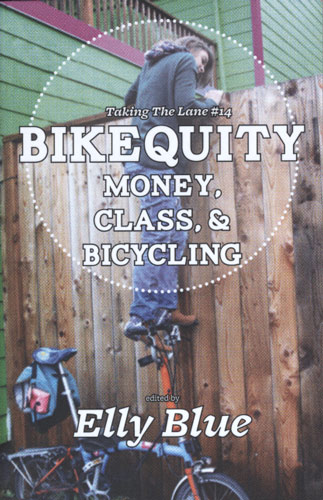Bikequity
Elly Blue of Microcosm Publishing has complied a mixed-genre anthology including essays, poetry, fiction, and even a recipe on cycling, empowerment, and the politics around transport and urban living. If you live in Portland, have a tendency for activism, or have just traded in your used Ford Corolla for a refurbished fixie, then this just might be the zine to slip into your back pocket for that next ride.
Elly Blue of Microcosm Publishing has complied a mixed-genre anthology including essays, poetry, fiction, and even a recipe on cycling, empowerment, and the politics around transport and urban living. If you live in Portland, have a tendency for activism, or have just traded in your used Ford Corolla for a refurbished fixie, then this just might be the zine to slip into your back pocket for that next ride.
Gorgeous in design, a pleasure to hold, almost retro, Bikequity is reminiscent of those old photocopied zines that circulated pre-internet, before Starbucks took every corner, before micro-breweries, Kombucha, and vapes. Back when critical mass was needed to sustain nuclear fission and not a two-wheeled pep rally. Back when gentrification was a word found in academic texts and not code for condos and whiteness. Most of the essays are written in clear prose and support the idea that cycling is cheaper than driving, better for the community, and a ticket to independence. Truisms difficult to refute include what Tammy Melody Gomez writes in the essay, “Really Awesome and Poor”:
When people comment on how impressed they are that I bicycle everywhere I need to go, I tell them that my bike is my fitness center because I cannot afford to pay to work out at one of those places. They smile and nod, often adding that they wish they had the gumption to do as I do. It’s not a brag, it’s just the truth.
Okay. Except for the use of the word gumption, which should be used in every essay, the prose and arguments feel commonplace. Shouldn’t a zine, just by definition, be a place of risk? Shouldn’t manifestos rock and challenge the status quo?
Bikequity’s highlights come in Adonia Lugo’s straightforward essay titled “Founding CicLAvia” about studying Bogota’s urban transformation and successfully implementing cultural change in Los Angeles. The event, “CicLAvia” is a closing of a busy city street for four hours on a Sunday, where “30-40,000 people rode bikes or walked along the route.” Through the workaday details of trying to organize the event, we can see just how difficult and how far North American cities have to go in order imitate anything like Amsterdam or Copenhagen. Pushing pedaling in America is like pulling teeth.
Another highlight is Do Jun Lee’s “‘Han’—Ted Riding” which stretches the indigenous Korean concept of Han (a traumatic transgenerational unresolved ghost-force) into the politics of daily commuting to Manhattan. Bouncing between racialized micro-aggressions to the pain of the Korean diaspora to the danger and love of cycling, the essay concludes with perhaps the most lyrical moment in the collection:
I’m breathing hard from both East River air on my right and the exhaust of the idling car traffic to my left depending on which way the wind blows. As I struggle and reach the crest of the bridge, I wipe aside the salty streams pouring down my face as my legs burn with something that belongs in the space between pain and joy.
Although Bikequity: Money, Class, & Cycling feels a little like a flat tire on a rainy day for a life-long cyclist, it might be perfect for that exuberant youth who has just discovered the spiritual joy and economic and political power that comes with pedaling daily rather than taking the elevator to the Stairmaster.





